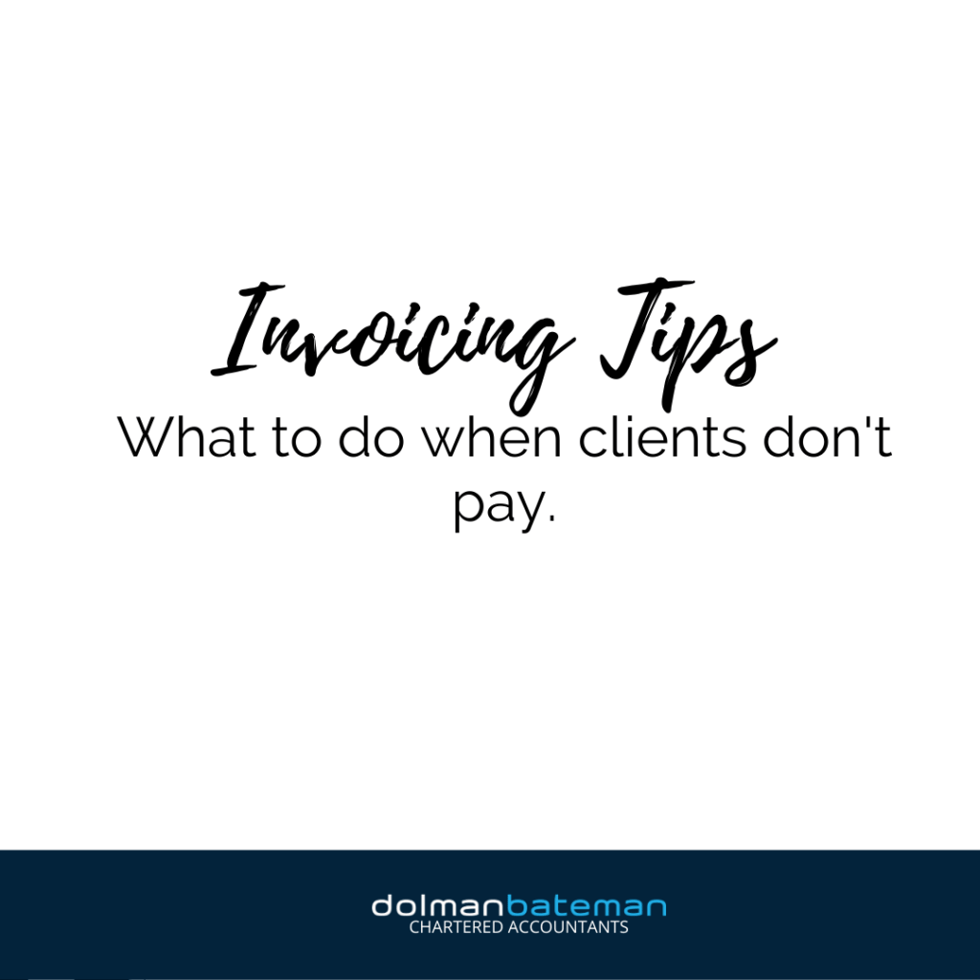Most businesses miss out on many customers and end up competing on price because they are not...
Invoicing tips - what do to when clients don't pay
INVOICING TIPS
Sending Late payment requests
It's not the most exciting job to do, but it is vital to business survival.
- When to follow up unpaid invoices?
If an invoice goes past the due date you’ll need to remind your customer. This often feels hard to do but do not put it off. You’re not asking for a favour: the customer has accepted a service from you and now it’s time for them to keep their side of the bargain.
Keep an eye on your accounts receivable (the list of invoices that aren’t paid) and start with the oldest debts first. Aim to keep reducing the number of unpaid invoices and the total amount of money owing to you.
Ways to chase overdue invoices
The longer you let an invoice go unpaid, the lower the chances that it ever will be. Start by following up fast with gentle reminders.
1. Write a payment request letter or email
The least daunting way to chase payment is to send an email. Be polite, quote the invoice number, say when it was due, and ask when you can expect payment. It’s a good idea to send the invoice again with your message.
2. Send a statement
A statement is different from an invoice in that it shows all the customer’s unpaid invoices and shows the summaries of all their invoices and payments – between two dates. Statements aren’t commonly sent anymore but they can still be a useful form of payment request when a customer has more than one unpaid invoice.
3. Pick up the phone
A phone call is extremely effective, although it can be slightly awkward and uncomfortable. It’s awkward for the customer too and that’s why it works. You don’t need to say much. Just be polite and friendly and tell them what invoice is late. Then let them do the talking.
If the client disputes some aspect of the invoice, stay calm and listen to what they have to say. Ask them to pay the rest of the invoice while you sort out the problem with them.
Always keep notes of your phone calls so that you have a reminder of the commitments your customer has made. Check regularly for their payment and phone again if necessary.
4. Charge a late payment fee
You can charge a fee for late invoices, but only if customers know you have a penalty policy. It’s a good idea to write late fees into your service agreement, and get customers to sign it before you start doing business. Then you can mention that penalties may kick in when you’re sending payment requests.
The gentle reminder email you don’t have to send
Following up on invoices can be time-consuming. You can remove yourself from the equation by using an online invoicing system. The software keeps a list of all your invoices and watches your bank deposits for matching payments. When an invoice is still unpaid on its due date, the software automatically sends a pre-written email reminding the customer they owe you. You’ll only need to get involved with cases where reminders have been ignored. An example of this software is Xero.
What to do when people just don’t pay?
1. Agree on a payment plan
If your customer isn’t paying because they’re low on cash, you could suggest they make part payments over several weeks or months. It will make your bookkeeping a little harder, but it’s worth it to get paid eventually. Remember to ask the customer to quote the invoice number in each part-payment they make, so it’s easy to keep track.
2. Stop supplying them until the outstanding invoice is paid
Non-paying customers are bad for business, so you’ll probably want to stop working with them. This can be complicated if their business is usually worth a lot to you. Cutting them off could signal the end of the relationship, so make sure you can live with that.
3. Get a debt collector to chase the overdue invoice
Debt collectors have a knack for getting overdue invoices paid out. That’s why they’re in business. But they may take 25% or more of the money as payment for their services. Check their terms before signing up.
4. Send a warning letter
A warning letter shows that you’re willing to get lawyers involved. It sets out what will happen if the payment isn’t made within a specified timeframe. It includes details of any interest payable and the threat of legal proceedings. The letter can be highly effective in recovering debts without actually having to go to court. A letter which has been prepared by a lawyer will not only cover all the required elements, it will also show that you’re serious about collecting the debt.
Last option - Write off the invoice as a bad debt
You may decide these steps are too drastic for a small outstanding invoice. Or perhaps you’ll try them and get nowhere. Either way, there’s a chance you’ll be left with an unpaid invoice from time to time. You need to write it off as a bad debt. This step is important for two reasons.
- It ensures your books reflect the lost income.
- It allows you to claim back any tax you may have already paid on the expected income.
If you would like to find out more or are looking for a new accountant, please contact us at Dolman Bateman and one of our expert accountants will be able to help you.
#business #accounting #sydneyaccountants #coronavirusfears #australianbusinesses #outbreak #economiccrisis #theaccountants #accountingsydney#accountingexperts #taxtime #taxcrunch #taxandaccounting #theaccountants #australianaccountants #financialadvice #thestimulus #ato #australiantaxoffice


